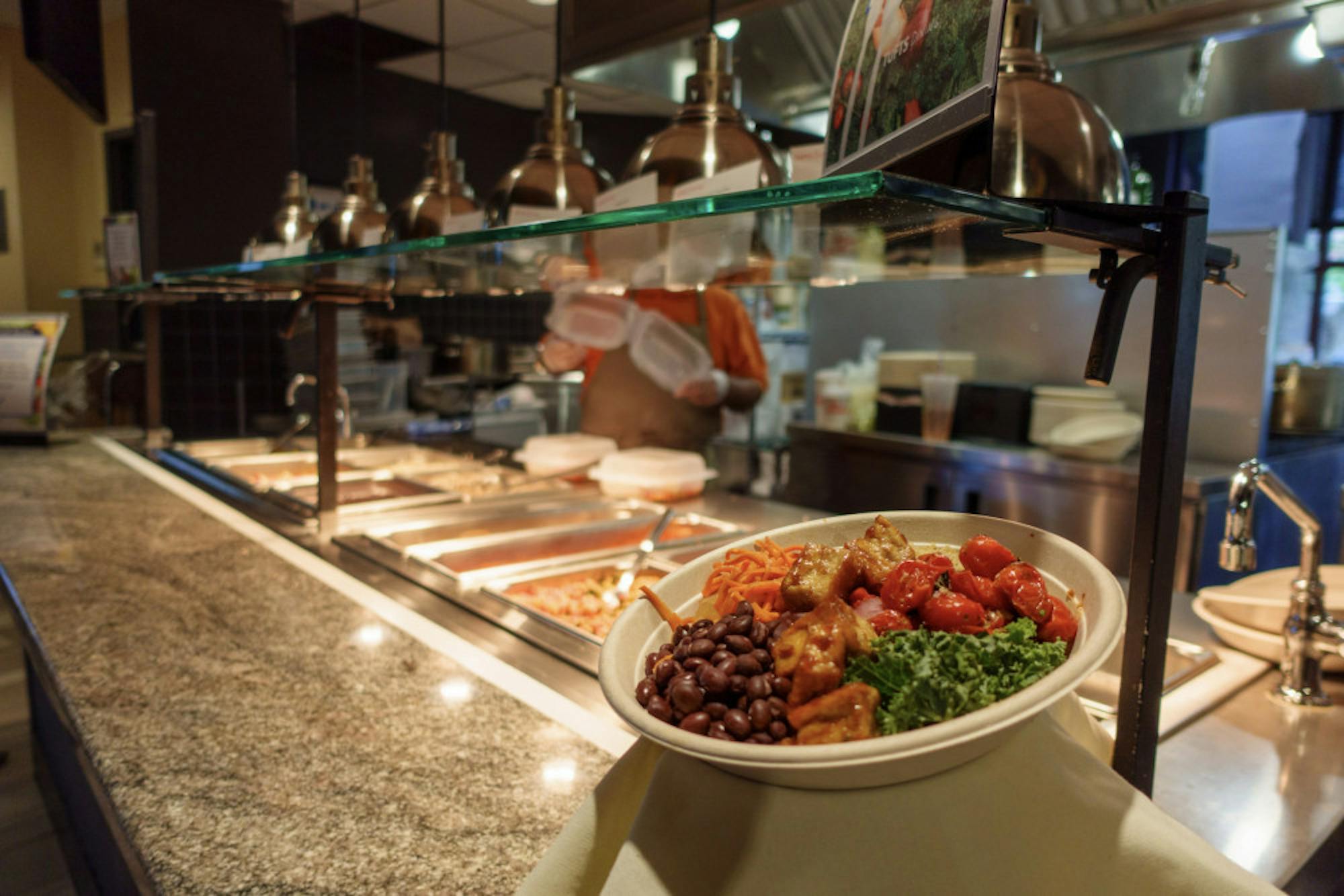At the beginning of the fall semester, Dewick-MacPhie Dining Center opened a new food line that offers vegan kosher food. The new station increases the availability of food for students with dietary restrictions.
The new food line, which is located across from the salad bar in the dining hall, has replaced the “Beans, Greens and Grains” station that used to be in this location. Because the line is both vegan and kosher, it does not include any meat or dairy options, primarily serving food such as grains, beans, tofu and more.
Jeannine Pecoraro, a sophomore who eats vegetarian and sometimes vegan, said that the new line helped to expand her dietary options in Dewick.
“I prefer [the kosher line] to the vegetarian section that they had last year,” Pecoraro said. “I definitely have a lot more to choose from and tons of fresh vegetables and all the veggie meals I could ask for.”
For food to be considered kosher, its ingredients and preparation must abide by kashrut, the Jewish food laws outlined in the Torah. Restricted foods under kashrut include pork and shellfish. Additionally, meat may not be consumed alongside dairy.
Some foods in a kosher kitchen must be kept separate from each other; meat and dairy products may not be stored together, and different utensils will generally be used for each product.
Asher Berlin, a sophomore who keeps kosher, explained how he finds options to eat in the dining hall, even when there are no designated kosher items.
“If I am at the dining hall, it’s basically a process of elimination, just checking the ingredients,” Berlin said. “If something with meat has milk in it, worst comes to worst … I go grab some pizza and maybe some rice. Or I try to make do the best I can [with] some vegetables, boiled eggs or some pasta.”
Some popular options at the kosher station so far have been the varied tofu dishes and the build-your-own grain bowl station, which offers a variety of toppings such as roasted vegetables, nuts and house-made dressings.
The need for a kosher food option was brought to the attention of Tufts Dining by Rabbi Naftali Brawer, the executive director of Tufts Hillel and the university’s Jewish chaplain. Patti Klos, director of dining and business services at Tufts, described how this new option is intended to increase dining options for students with different dietary restrictions.
“Tufts Dining strives to be inclusive and provide solutions to students’ dietary needs including those rooted in their religion,” Klos wrote in an email to the Daily. “Rabbi Brawer and we saw a need for a fully kosher food option in a residential dining center, and we have worked closely together as we created this option for students. A full meat and/or dairy kitchen wasn’t feasible currently, and a plant-based option was feasible.”
This new line is only one of multiple efforts in recent years to increase accessibility for students who have dietary restrictions. Dewick also has an “All-9 Free” section, which offers food free of the top nine most common food allergies. Last year, Carmichael Dining Center transitioned to a tree nut, peanut and gluten-free facility.
To ensure full kosher compliance, the dining center has worked closely with Rabbi Brawer as well as a team of trained student mashgichim, who supervise the station to ensure that kashrut is being adhered to. Since kosher meat and dairy are normally required to have their own separate sets of plates, the kosher station uses compostable plates to avoid cross-contamination.
Despite the positive feedback for the new station, other students have found the station’s offerings underwhelming.
“Personally, I was not very impressed by it,” Berlin said. “I’m not somebody who regularly eats vegan food. So, in general, I would consider it a pretty poor night if the only thing I could eat was to be found at that [station]. But somebody who is vegan might have had a different experience.”
Klos said that Tufts Dining plans to continue to increase vegan options at all dining locations, while also adapting to all students’ dietary needs.
“We continue to introduce more and more vegan items on menus throughout Dining, to match student’s food preferences and to be more sustainable,” Klos wrote. “The Tufts Dining team is continually evaluating our menu to meet the dietary needs of our students.”
Despite Berlin’s personal opinion of the new line, he acknowledged the importance of increasing accessibility to kosher food.
“It is significant that the university is making more of an effort to make it easier for Jewish students to follow their religion on campus, and I think it's a step in the right direction,” Berlin said. “But I would say there’s still quite a bit of work to be done if they’re going to achieve that goal.”






